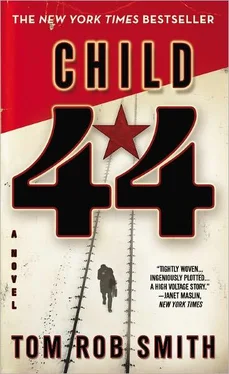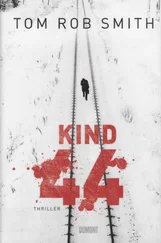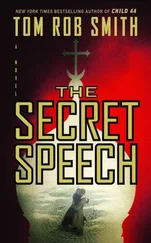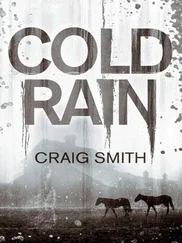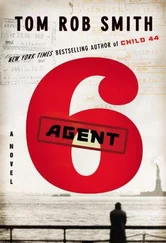Brodsky is gone.
When Leo had heard those words he’d felt sick: he’d called an emergency meeting with Major Kuzmin at his home address. Leo now had the proof of guilt he’d been looking for but he no longer had the suspect. To his surprise his mentor had seemed gratified. The traitor’s behaviour validated his theory: their business was mistrust. If an allegation contained only one per cent truth it was better to consider the entire allegation true than to dismiss it. Leo was instructed to catch this traitor at all costs. He was not to sleep, eat, rest, he was not to do anything until that man was in their custody, where — as Kuzmin had smugly pointed out — he should have been three days ago.
Leo rubbed his eyes. He could feel a knot in his stomach. At best he seemed naive, at worst incompetent. He’d underestimated an opponent and feeling a sudden, uncharacteristic burst of anger he considered kicking the upturned table. He decided against it. He had trained himself to keep his feelings locked out of view. A junior officer hurried into the room, probably keen to help, to prove his dedication. Leo waved him away, wanting to be alone. He took a moment to calm down, staring out of the window at the snow which had begun to fall over the city. He lit a cigarette, blowing smoke on a pane of glass. What had gone wrong? The suspect must have sighted the agents tailing him and planned his escape. If he was burning documents that meant he was keen to conceal material relating to his espionage or his current destination. Leo was sure that Brodsky had an escape plan, a way to get out of the country. He had to find some fragment of this plan.
The neighbours were a retired couple in their seventies who lived with their married son, his wife and their two children. A family of six in two rooms, not an unusual ratio. All six of them were sitting in their kitchen side by side with a junior officer standing behind them for the purpose of intimidation. Leo could see that they understood that they were all implicated in another man’s guilt. He could see their fear. Dismissing this observation as irrelevant — he’d been guilty of sentimentality once already — he walked up to the table.
— Anatoly Brodsky is a traitor. If you help him in any way even by saying nothing you will be treated as an accomplice. The pressure is on you to prove your loyalty to the State. There is no pressure on us to prove your guilt. That, right now, is taken for granted.
The elderly man, the grandfather, no doubt a savvy survivor, was quick to offer every piece of information he had. Copying Leo’s choice of words, he claimed the traitor had gone to work that morning a little earlier carrying the same case as usual, wearing the same coat and hat. Not wishing to seem uncooperative the grandfather offered opinions and suggestions as to where this traitor could be, all of which Leo sensed were nothing more than desperate guesswork. The grandfather concluded by saying how much everyone in their family disliked and mistrusted Brodsky as a neighbour and how the only person who liked him was Zina Morosovna, the lady living downstairs.
Zina Morosovna was aged somewhere in her fifties and trembling like a child, a fact she was trying unsuccessfully to hide by smoking. Leo found her standing beside a cheap reproduction of a famous Stalin portrait — smooth skin, wise eyes — hung prominently over her fireplace. Perhaps she thought it might protect her. Leo didn’t bother to introduce himself, or show his identity card, cutting straight to the chase in an effort to disorient her.
— Why is it you’re such good friends with Anatoly Brodsky when everyone else in this building disliked and mistrusted him?
Zina was caught off guard; her sense of discretion blunted by her indignation at this lie:
— Everyone in this building liked Anatoly. He was a good man.
— Brodsky is a spy. Yet you call him good? Treachery is a virtue?
Realizing her mistake too late, Zina began to qualify her comment.
— All I meant was that he was very considerate with the noise. He was polite.
These qualifications were stuttering and irrelevant. Leo ignored them. He took out a pad and wrote down her ill-chosen words in large visible letters.
HE WAS A GOOD MAN
He wrote clearly so that she could see exactly what he was writing: he was writing off the next fifteen years of her life. Those words were more than enough to convict her as a collaborator. She’d receive a lengthy sentence as a political prisoner. At her age she had little chance of surviving the Gulags. He didn’t need to say any of these threats aloud. They were common currency.
Zina retreated to the corner of the room, stubbed out her cigarette and immediately regretted it, fumbling for another.
— I don’t know where Anatoly has gone but I do know that he has no family. His wife was killed in the war. His son died of tuberculosis. He rarely had any visitors. As far as I could tell he had few friends…
She paused. Anatoly had been her friend. They’d spent many nights together, eating and drinking. There was a time when she’d even hoped that he might fall in love with her but he’d showed no interest. He’d never got over the loss of his wife. Caught up in her recollections she glanced at Leo. He wasn’t impressed.
— I want to know where he is. I don’t care about his dead wife or his dead son. His life story doesn’t interest me unless it’s relevant to where he is right now.
Her life was in the balance — there was only one way to survive. But could she betray a man she loved? To her surprise the decision took less deliberation then she would’ve expected.
— Anatoly kept himself to himself. However, he did receive and send letters. Occasionally he left them with me to post. The only regular correspondence was addressed to someone in the village of Kimov. It’s somewhere north of here, I think. He mentioned that he had a friend there. I don’t remember the name of the friend. That’s the truth. That’s all I know.
Her voice was choked with guilt. While no outward display of emotion could ever be taken at face value Leo’s instincts told him that she was betraying a confidence. He ripped out the incriminating page from his note-book and handed it to her. She accepted the sheet as payment for a betrayal. He saw contempt in her eyes. He didn’t let it bother him.
The name of a rural village to the north of Moscow was a tenuous lead. If Brodsky was working as a spy it was much more likely he was being sheltered by the people he was working for. The MGB had long been convinced there was in existence a network of safe houses under foreign control. The idea of a foreign-funded traitor falling back on a personal connection — a collective farmer — ran contrary to the notion that he was a professional spy. And yet Leo felt sure this was a lead he should pursue. He brushed the discrepancies aside: his job was to catch this man. This was the only clue he had. Equivocation had already cost him.
He hurried to the truck parked outside and began rereading the case file, searching for something which might connect with the village of Kimov. He was interrupted by the return of his second in command, Vasili Ilyich Nikitin. Aged thirty-five, five years older than Leo, Vasili had once been one of the MGB’s most promising officers. Ruthless, competitive, he harboured no loyalties to anyone except the MGB. Leo privately considered those loyalties to be less about patriotism and more about self-interest. In his early days as an investigator Vasili had signalled his dedication by denouncing his only brother for making anti-Stalinist remarks. Apparently the brother had made a joke at Stalin’s expense. He’d been drunk at the time, celebrating his birthday. Vasili had written up the report and the brother had been given a twenty-year labour sentence. That arrest had worked in Vasili’s favour until the brother escaped three years later, killing several guards and the camp doctor in the process. He was never caught, and the embarrassment of this incident hung around Vasili’s neck. If he hadn’t strenuously helped in the search for the fugitive his career might not have survived. Instead it survived in a much weakened state. With no more brothers left to denounce, Leo knew his deputy was on the lookout for some other way of getting back in favour.
Читать дальше
